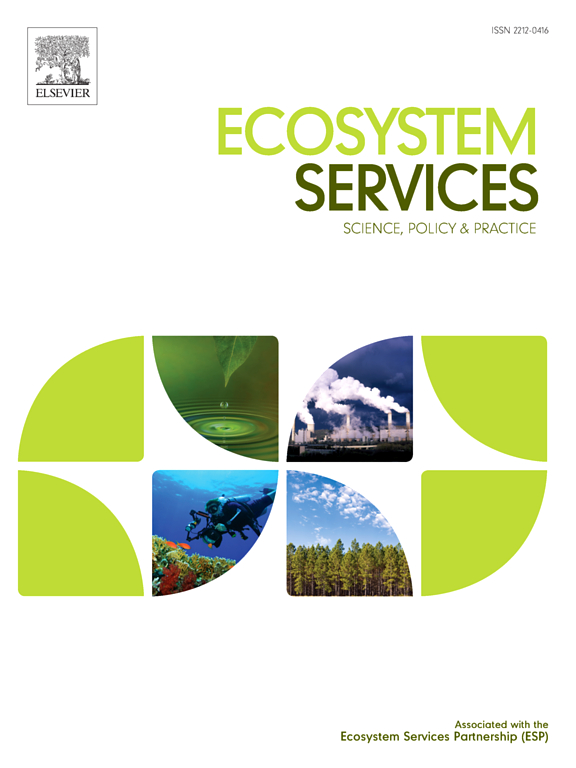与猫头鹰相关的生态系统服务和危害的全球评估
IF 6.6
2区 环境科学与生态学
Q1 ECOLOGY
引用次数: 0
摘要
了解生物多样性提供的生态系统服务有助于保护生物多样性,维护生态系统健康和人类福祉。虽然有一些研究关注一些鸟类提供的服务,但对夜间顶级捕食者(如猫头鹰(箭形目))作为生态系统服务提供者的作用却知之甚少。鉴于很少有文章专门评估猫头鹰的生态系统服务,我们回顾了已发表的有关猫头鹰生态学和自然史的科学信息,以评估它们作为全球生态系统服务提供者和非服务提供者的角色。我们的文献综述显示,猫头鹰提供了广泛的生态系统服务,也提供了少量的非服务。调节性生态系统服务是报道最多的类别(81.8%),其次是文化和提供性生态系统服务,共占分析文章的 18.2%。一半的研究在欧洲进行(50%),其次是南美洲(19.8%)和北美洲(12.5%);其余地区占 17.7%。研究最多的鸟属是鸮属(63.9%)和鸮属(11.5%),调节生态系统服务是这两个鸟属报告的主要类别。与生态系统服务的数量相比,猫头鹰的生态系统服务很少。负面观念助长了对猫头鹰的迫害和捕杀,影响了猫头鹰的保护及其提供的服务。猫头鹰通过控制啮齿动物数量、帮助控制疾病以及丰富文化和科学知识,在维持生态系统平衡方面发挥着重要作用。本文章由计算机程序翻译,如有差异,请以英文原文为准。
Global assessment of ecosystem services and disservices associated with owls
Understanding the ecosystem services provided by biodiversity can be useful for its protection and for maintaining ecosystem health and human wellbeing. Although several studies have focused on services provided by some birds, little is known about the role of nocturnal top predators, such as owls (order Strigiformes), as ecosystem services providers. Given that few articles specifically evaluated owl ecosystem services, we reviewed published scientific information on the ecology and natural history of owls to assess their role as providers of ecosystem services and disservices worldwide. Our literature review revealed that owls provide a wide range of ecosystem services and, to a lesser extent, disservices. Regulating ecosystem services were the most frequently reported category (81.8 %), followed by cultural and provisioning ecosystem services, together accounting for 18.2 % of the analyzed articles. Half the studies were conducted in Europe (50 %), followed by South America (19.8 %) and North America (12.5 %); the remaining regions accounted for 17.7 %. The most studied genera were Tyto spp. (63.9 %) and Asio spp. (11.5 %), with regulating ecosystem services being the primary category reported for both genera. Owl ecosystem disservices were few in comparison with the number of ecosystem services. Negative perceptions promote the persecution and killing of owls, affecting their conservation and the services they provide. Owls play a vital role in maintaining ecosystem balance by controlling rodent populations, aiding in disease control, and enriching cultural and scientific knowledge.
求助全文
通过发布文献求助,成功后即可免费获取论文全文。
去求助
来源期刊

Ecosystem Services
ECOLOGYENVIRONMENTAL SCIENCES&-ENVIRONMENTAL SCIENCES
CiteScore
14.90
自引率
7.90%
发文量
109
期刊介绍:
Ecosystem Services is an international, interdisciplinary journal that is associated with the Ecosystem Services Partnership (ESP). The journal is dedicated to exploring the science, policy, and practice related to ecosystem services, which are the various ways in which ecosystems contribute to human well-being, both directly and indirectly.
Ecosystem Services contributes to the broader goal of ensuring that the benefits of ecosystems are recognized, valued, and sustainably managed for the well-being of current and future generations. The journal serves as a platform for scholars, practitioners, policymakers, and other stakeholders to share their findings and insights, fostering collaboration and innovation in the field of ecosystem services.
 求助内容:
求助内容: 应助结果提醒方式:
应助结果提醒方式:


